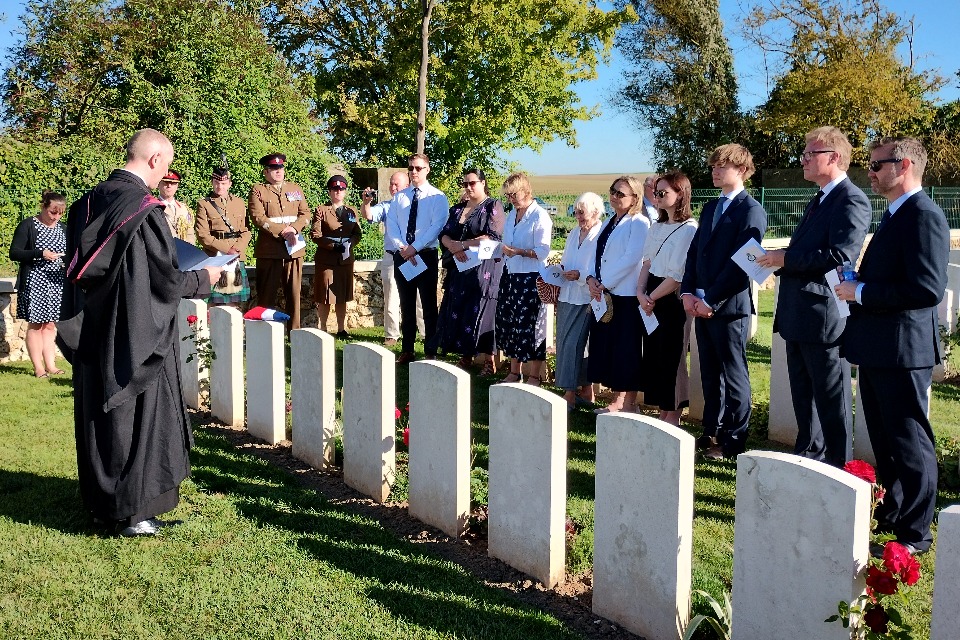The grave of Captain (Capt) Frederick Arthur John Robertson Brooke, a doctor killed aged 55 during World War One whilst serving with the Royal Army Medical Corps (RAMC), has finally been located in the Champagne region of France, more than 105 years after his death.
A rededication service, which was organised by the MOD's Joint Casualty and Compassionate Centre (JCCC), also known as the 'MOD War Detectives', was held at the Commonwealth War Graves Commission's (CWGC) La Ville-aux-Bois British Cemetery near Reims earlier today (6 September).
The rededication service was attended by three generations of Capt Brooke's family, including his great granddaughter, Ana Retallack, who had travelled from the state of Victoria, Australia, with her husband and children to attend the service.
Mrs Ana Retallack said:
Our family is so very grateful to everyone involved in locating the grave of Captain Frederick Brooke, RAMC. We thank Rosie Barron (Joint Casualty and Compassionate Centre) for making the initial contact and being so helpful in rearranging the service to coincide with our visit from Australia. We give special thanks to researcher, David Tattersfield (The Western Front Association), for bringing together his extensive knowledge of the First World War and his relentless detective work to present the case to the Commonwealth War Graves Commission for verification.
The Rededication Service will bring together three generations of our family from the UK and Australia to honour not only the service of Frederick but that of the 1st Battalion The Wiltshire Regiment, too. We know how incredibly privileged we are to be able to pay respects to our grandfather, great grandfather, and great, great grandfather. It will no doubt be a very moving occasion.
The grave of Capt Brooke was found after a researcher submitted evidence suggesting that his grave could be identified. Further research conducted by the National Army Museum and JCCC before final assessment by the MOD team, confirmed their findings. Rosie Barron, JCCC caseworker, then set about tracing Capt Brooke's family who were in both Dorset and Australia.
Rosie Barron, JCCC case lead, said:
It has been a privilege to work with the RAMC and The Royal Regiment of Scotland to organise the rededication service for Capt Brooke and to have his family present made it even more poignant.
The contribution of medical personnel was crucial to the war effort and the survival of many of the wounded depended on their work. Capt Brooke was killed in action having put himself in harm's way to save others. It is important that his sacrifice is not forgotten.
The service was conducted by the Reverend Tim Clarke-Wood CF, Chaplain to 4th Battalion The Royal Regiment of Scotland and was attended by serving soldiers of the RAMC.

The service conducted by Reverend Tim Clarke-Wood
The Reverend Clarke-Wood said:
There is sense that when a body is successfully identified we are correcting a past wrong. That to ascertain who is buried in a particular place somehow creates a distinct moment of historical reconciliation - where the story of the person is finally connected permanently with their resting place. Capt Brooke's story is significant in that he served at a more advanced age than most - at 55 he was experienced in life and no doubt brought that wisdom into his role as a Medical Officer. As a Padre these moments are precious as you take opportunity to participate in a person's story that started in the 19th Century. It is my great privilege to have rededicated Capt Brooke's grave and to do so with so many of his family present. I hope that this marks a special moment within the Brooke family history.
The headstones over their graves have been replaced by the CWGC.
CWGC Director for France, Xavier Puppinck, said:
We are grateful to all involved for enabling us to formally recognise this brave man with a CWGC headstone at our cemetery today. It's even more special that members of his family were able to be present for this ceremony. It is our honour to care for his grave, and that of his comrades, in perpetuity.






